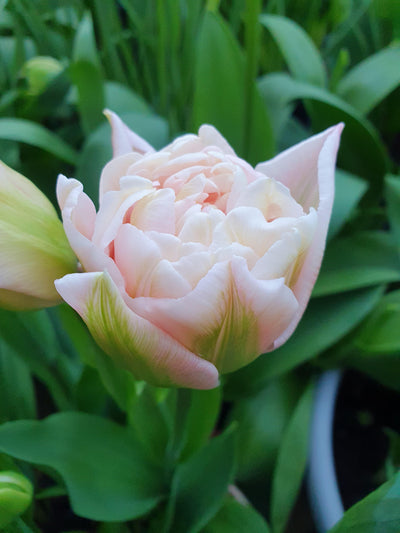Jobs for late October
This is a busy and somewhat frantic time for gardeners, with the rush to prepare seeds and bulbs combining with the never-ending task of cutting back and protecting tender plants – at moments the to-do list can seem insurmountable! However there is one key task that is vital for the health of your entire garden, and that is mulching. The most effective way to improve your soil structure and by doing so the quality of your beloved plants is by adding a layer of organic matter to the surface of the soil – this is known as mulching. Done now it will provide a barrier for your borders, not only preventing washaways from winter rain it will act as a blanket to insulate and protect plants over winter. The mulch will slowly yet effectively be incorporated into your soil by the worms and microorganisms beneath, making mulching a low effort yet high impact way of making your garden better than ever this autumn - not to mention it looks great too!

There are numerous organic and inorganic variations of mulch, and which is best suited to your garden depends on what your soil needs and what will create the desired effect. Organic mulches include leaf mould, well-rotted horse manure, homemade compost, mushroom compost and even composted bark! There are so many variations of mulch that will provide nutrients by enriching your soil for the months and even years to come. Mulches can be relatively inexpensive too for gardeners on a budget – leaf mould and garden compost can be prepared for free a year in advance using all your garden waste; if allowed to break down over the summer and turned regularly they will be ready for use as mulch by the following year. Alternatively, inorganic mulches such as a layer of grit or gravel will not provide nutrients, however will succeed in sharpening drainage and creating the aesthetic of a gravel garden in a sunny and dry aspect. However, the most traditional and arguably the most effective form of mulch for an ordinary border is compost – be it multipurpose or garden made.

Mulching is an easy, simple and satisfying process. Beforehand, ensure that the area is cleared of any perennial weeds and raked over smoothly. It is also effective to water the area if particularly dry prior to mulching, as the mulch will lock in the moisture and allow the roots of the plants to remain hydrated. Lay between 1 and 2 inches of your chosen mulch on your beds and borders, taking care to lay it around the stems, trunks and shoots of perennials, trees and shrubs. Avoid smothering any plant with compost as this can damage lower stems and can even lead to rot. A thick layer of mulch will be very effective in insulation and weed suppression, however bulbs and self-sown seedlings will struggle to penetrate any thicker than a 5cm layer so a medium of around 1 to 2 inches is optimal. Depending on your mulch, use your hands or a spade to spread it, ensuring that it is distributed evenly across the whole area.

The best and most effective places to use mulch in your garden are where it will be most needed, and where it will help in ensuring your garden looks neat and tidy! Around and above spring bulbs will not only give them more vigour but will allow their bright and jewel-like colours to shine above the neat, dark surface. Under hedges, especially new hedges, is an area that will benefit from an annual mulch to lock in moisture and feed the hedging plants: plants that are often overlooked and neglected. Similarly, fruit trees and bushes will also benefit from the extra boost provided by mulch. This keeps the plants healthy and allows them to build up resistance to pests and diseases, as well as allowing them to produce healthy and good quality fruits.
When buying mulch, choose what is the best for the effect you want to create. For example, avoid inorganic mulch like gravel if you want to improve the nutrient content of the soil. Also bear in mind that inorganic mulch will break down into the soil over the space of a few years. This will improve your soil structure overall, however will need replenishing to minimise washaways of soil in heavy downpours and to keep the bed or border looking fresh and replenished.

A great option for mulch is the Natural Grower Organic Peat Free Compost available through The Rose Press Garden as either a one off purchase or a quarterly subscription, which equals out to one bag a month. Not only is this mulch good for your soil and the planet, it is a simple and effective solution for gardeners in a rush! It’s also a great idea for those unsure what mulch to choose for their garden, as it has everything – not only environmentally friendly it has all of the nutrients that soil needs most. With free delivery it is there when you need it, providing you with compost right the year round that can be used for sowing seeds, planting up containers and, of course, mulching! Another great solution would be to order double the quantity in the season for mulching, especially if you have a larger garden as this will allow you to create a larger scale effect.
There really is no better way to protect plants, enrich your soil and show your borders some love than mulching - it is the perfect job to do now to ensure your garden is ready to take winter in its stride, and there is no task more satisfying on a sunny autumn weekend!





Leave a comment